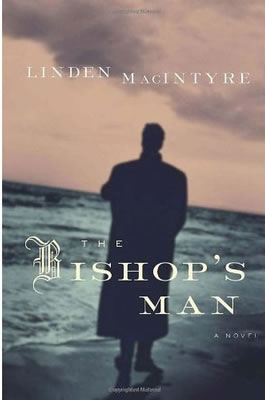
The Bishop's Man by Linden MacIntyre (Jonathan Cape, £12.99)
Priestly child-abusers in Canada dread the arrival of Father Duncan MacAskill. They know he carries the Bishop’s message that they are to go to ground at once, before their activities become an embarrassment to Holy Mother Church.
The Bishop has seen how unpleasant things can become when the activities of the Christian Brothers in Newfoundland go public, and if there is anything he can do about it, he is not going to have a similar scandal on his patch. So no one must know. The police must be kept out, the families silenced, the guilty priests spirited away somewhere. It is, after all, how the Catholic Church dealt with the problem in Canada, Ireland, the USA and Australia, and how it is trying to deal with it here. It lied, and lied, and lied, while Catholic children were being brought up to believe that a lie was a mortal sin, for which you would fry in Hell for eternity.
Father MacAskill is a wonderful creation, long, lean, black-coated, dispirited and disillusioned, forcing himself to believe in the dirty duty his Bishop makes him perform, dealing with the abusers as a managerial problem and avoiding the eyes of the victims. “I fumble for the rosary in the pocket of my overcoat,” he says. “The mindless recitation always helps subdue anxiety.... The smooth, small beads are soothing on the fingertips.” Mr MacIntyre almost manages to makes us care about the wretched man.
Like Communists during Stalin’s purges, the priestly hierarchy simultaneously know and do not know. “It’s all fantasy,” says the exasperated Bishop at one point. “Vague allegations. I saw something on TV the other night. False memory, or something like that. False memory syndrome. There’s a lot of that around now.”
Father MacAskill still believes in prayer, yet he has learned to use it with the utmost cynicism. He suggests to the angry father of a victim that they pray together and in less than a minute the man is sobbing, which was the object of the exercise: “Anger is safest when there are tears close by to extinguish it.” It is not what the Catholic writer GK Chesterton intended when he wrote of “all the easy speeches/ That comfort cruel men” but there is no better description of the great evasions churchmen used, and still use, to hide or diminish what they did.
Despite the grimness of its subject matter, this is a rather charming and evocative book. Often it feels as though it’s less about child abuse, and more about the bleak bit of the Nova Scotia coast where it’s set, with its fishing, its boats, its lonely, inbred people and their sense of impotent outrage as big companies come in and take the best of what they have. You feel cold Canadian wind and waves about you, much as you do when reading E Annie Proux’s The Shipping News.
It is a fascinating, though meandering, novel with a surprise conclusion which feels less like a revelation than an evasion. For in the end Mr MacIntyre, like Father MacAskill, does not want to face the big issues he raises. He does not want to see too much of the lives of the victims, nor to ask whether priests have forfeited trust for ever. And that is not surprising, for author and hero share a lot. They were born in the same year, in the same part of Canada, to the same sort of family. When MacAskill became a priest, MacIntyre became a journalist. You sometimes suspect he is writing about the life he might have lived, and he writes about it with understanding, compassion and forgiveness. Perhaps a little too much.

